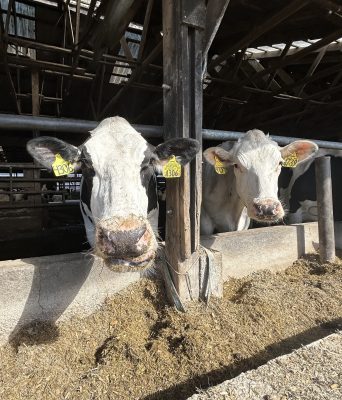By Abigayle Ward – Soil Science Graduate Student, UConn Department of Plant Science & Landscape Architecture

As temperatures warm up, perhaps you feel inclined to open windows to let some fresh air into your home or to feel the breeze on your morning commute. But then it hits you: The pungent aroma of freshly-spread manure. The few weeks that the smell persists serve as a reminder of the agricultural roots of Connecticut. Dairy farming began during the American colonial period in the 1600s, and milk remains one of the most important agricultural products in Connecticut. Some dairy farms have been in continuous operation for over 10 generations.
A single cow can produce around 100 pounds – about 18 gallons – of manure per day. Connecticut is home to nearly 19,000 dairy cows, so you do the math – that’s a lot of manure!
Typically, farmers spread manure on their crop fields twice per year: Once in the early spring, and again after corn harvest, usually in late fall. Manure is rich in nutrients, which helps grow the crops farmers use to keep happy cows throughout the year. Manure is also an excellent source of organic matter, which enriches the soil with carbon, provides nutrients to support healthy soil microbiomes, and gives our sandy Connecticut soils structure, which is essential for happy crops and high yields.
Many Connecticut dairy farmers are also on the forefront of research and development. In Coventry, Hytone Farm uses a brand-new anaerobic digester to harness the power of microorganisms to break down thousands of gallons of manure and food waste every day. Biogasses, such as methane, are collected and can be used to generate electricity. The solids, called “digestates”, can be used as fertilizer, animal bedding, or even as building materials. Freund’s Farm in East Canaan has been turning digestates into compostable, nutrient-rich CowPots, which can be buried directly in your garden and will biodegrade over time. Running since 1997, Freund’s is home to one of the first anaerobic digesters in New England. Collins Powder Hill Farm – home of the Collins Creamery – makes and sells compost from leaves and manure. All these practices help these local farms, and many others, increase carbon sequestration, reduce greenhouse gas emissions, and yes, reduce the smell of manure.
For home gardeners who wish to harness the power of manure, applying a commercially produced manure compost is the safest route. While applying raw manure is safe for crops that will not be consumed by humans, composted manure is recommended for application in gardens where human food is being grown. The composting process heats up the manure to temperatures that kill pathogens, such as E. coli, which could make you sick. Furthermore, composted manure should be odorless – getting your garden many of the benefits without the smell!
While the smell may be a mild inconvenience now, it is a sign that our dairy farmers are hard at work, continuing a tradition older than our country and serving our communities. You can support our state’s dairy farmers by purchasing locally-produced dairy products, adding some composted manure to your garden, and – of course – waving to the tractor drivers!
The UConn Home & Garden Education Center supports UConn Extension’s mission by providing answers you can trust with research-based information and resources. For gardening questions, contact us toll-free at (877) 486-6271, visit our website at homegarden.cahnr.uconn.edu, or reach out to your local UConn Extension center at cahnr.uconn.edu/extension/locations.
This article was published in the Hartford Courant Apr. 5 2025